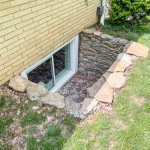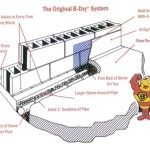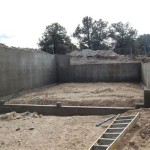Why Is My Basement Floor Crumbling?
A crumbling basement floor is a concerning issue for homeowners. It signals potential structural problems and can lead to further damage if left unaddressed. Understanding the underlying causes is the first step towards implementing an effective solution.
One common culprit is water damage. Basements, being below ground level, are particularly susceptible to moisture intrusion. Water can seep through cracks in the foundation walls, infiltrate through porous concrete, or result from plumbing leaks. This moisture weakens the concrete, leading to spalling, flaking, and eventually, crumbling.
The type of concrete used in the original construction plays a significant role in its durability. Low-quality concrete mixes, with insufficient cement or an improper water-to-cement ratio, are more prone to deterioration. Over time, these weaker mixes become susceptible to crumbling, especially in the presence of moisture.
The age of the concrete is another factor. Concrete, like any construction material, has a lifespan. Over time, the natural process of carbonation occurs, where carbon dioxide in the air reacts with the calcium hydroxide in the concrete. This weakens the concrete's internal structure, making it more vulnerable to damage.
Sulfate attack can also contribute to concrete deterioration. Sulfates, present in some soils and groundwater, can react with the cement paste in the concrete. This reaction produces expansive compounds that cause internal stress, leading to cracking and crumbling. This is particularly common in areas with clay soils.
Improper curing during the initial construction phase can also weaken the concrete. Concrete requires specific moisture and temperature conditions during the curing process to achieve its optimal strength. If these conditions aren't met, the resulting concrete may be weaker and more prone to crumbling.
Freeze-thaw cycles can exacerbate existing weaknesses in concrete. Water expands when it freezes, exerting pressure within the concrete pores. Repeated cycles of freezing and thawing can cause cracks to develop and widen, ultimately leading to crumbling. This is especially problematic in colder climates.
The presence of de-icing salts can further accelerate concrete deterioration. These salts, often used on sidewalks and driveways, can be tracked into the basement. The chloride ions in these salts can penetrate the concrete, corroding the reinforcing steel and weakening the concrete matrix, contributing to crumbling.
Poor drainage around the foundation can contribute significantly to moisture problems in the basement. If water is allowed to pool against the foundation walls, it can seep into the basement and saturate the concrete floor. This constant exposure to moisture weakens the concrete and accelerates the crumbling process.
The presence of expansive soils around the foundation can create significant pressure on the basement walls and floor. These soils expand when wet and shrink when dry, creating cycles of stress that can cause cracks to form and the concrete to crumble. This problem is more prevalent in areas with clay-rich soils.
Heavy traffic or excessive loads on the basement floor can also contribute to its deterioration. While concrete is designed to withstand a certain amount of load, consistently exceeding this limit can cause stress fractures and contribute to crumbling. This is especially relevant in basements used for storage or workshops.
Chemical exposure can also weaken concrete. Certain chemicals, such as acids or alkalis, can react with the cement paste and weaken the concrete's structure. This is more likely in basements used for industrial purposes or where chemicals are stored.
Identifying the specific cause of the crumbling requires a thorough inspection of the basement and surrounding area. This may involve assessing the drainage around the foundation, examining the concrete for signs of moisture damage, and evaluating the soil conditions.
Addressing the underlying issue is crucial to prevent further damage. Solutions can range from improving drainage around the foundation to repairing cracks in the concrete and implementing waterproofing measures. In severe cases, complete replacement of the concrete floor may be necessary.
Regular maintenance is essential to prevent future crumbling. This includes ensuring proper drainage, addressing any leaks promptly, and protecting the concrete from exposure to chemicals and de-icing salts. Periodic inspections can help identify potential problems early on, before they escalate into major repairs.

Concrete Floor Crumbling Causes And How Best To Fix It Doityourself Com Community Forums

How To Fix Crumbling Concrete Basement Floor Legacy Applications

Concrete Floor Crumbling Causes And How Best To Fix It Doityourself Com Community Forums
Floor Crumbling At Edges Diynot Forums

Signs Of Crumbling Foundation How To Fix It Kent Repair

Causes Of Basement Floor Cracks And What To Do About Them News Events For Systems Inc

Spalling The Effect High Heat Has On Concrete And 5 Steps For Restoration Remediation Magazine

Concrete Floor Crumbling Causes And How Best To Fix It Doityourself Com Community Forums

Crumbling Concrete Flooring Under Carpet General Inspection Discussion Internachi Forum

Preventing Efflorescence Spalling In Foundation Building Advisor
Related Posts







